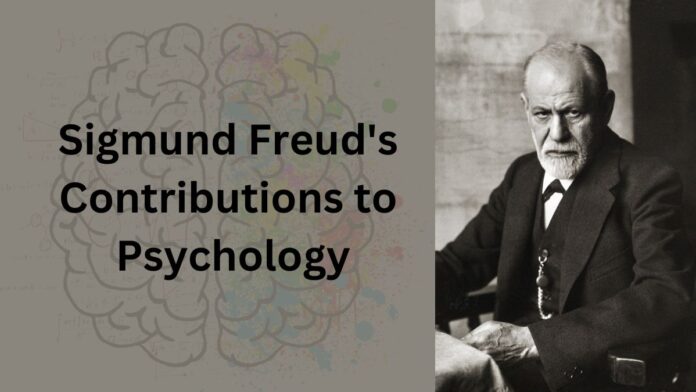Defining Sigmund Freud’s Contributions to Psychology in a single sentence is impossible. But we will discuss his impeccable work in complete detail.
Sigmund Freud, the father of psychoanalysis, was a pioneer in the field of psychology. He revolutionized the way people understand and treat mental illness through his theories and techniques. From the unconscious mind to the Oedipus complex, Freud’s ideas have had a lasting impact on the field of psychology and continue to shape our understanding of human behavior and the mind.
The Unconscious Mind
One of Freud’s most influential contributions to psychology is his theory of the unconscious mind. Freud believed that a large portion of our thoughts and behaviors are driven by unconscious desires, impulses, and memories that are not immediately accessible to conscious awareness.
The Structure of the Mind
Freud proposed that the mind is divided into three parts: the conscious, preconscious, and unconscious.

The conscious mind is what we are aware of at any given moment, while the preconscious contains thoughts and memories that can be easily brought to conscious awareness. The unconscious, on the other hand, contains thoughts, desires, and impulses that are not immediately accessible to conscious awareness but still influence our behavior.
The Psychoanalytic Process
Freud also developed a therapeutic technique called psychoanalysis, which is still used today. The psychoanalytic process involves a series of free associations, transference, and interpretation. In which the patient is encouraged to talk freely about their thoughts and feelings, and the therapist uses the insights gained from these conversations to help the patient understand and resolve unconscious conflicts.
The Interpretation of Dreams
One of the key components of psychoanalysis is the interpretation of dreams. Freud believed that dreams are a window into the unconscious mind and that they reveal unconscious desires, fears, and conflicts. Through the analysis of dreams, Freud believed that patients could gain insight into their unconscious mind and work to resolve unconscious conflicts.
Very Important Milestones
| Date | Milestone |
|---|---|
| 1856 | Birth of Sigmund Freud |
| 1882 | Josef Breuer describes the case of Anna O to Freud |
| 1886 | Freud begins providing therapy |
| 1895 | Birth of Anna Freud |
| 1900 | Publication of Freud’s book “The Interpretation of Dreams” |
| 1896 | Freud coins the term “psychoanalysis” |
| 1908 | Formation of the Vienna Psychoanalytic Society |
| 1909 | Freud’s first and only trip to the United States |
| 1910 | Formation of the International Psychoanalytic Association |
| 1913 | Break between Freud and Jung in psychoanalysis |
| 1938 | Dissolution of Vienna Psychoanalytic Society |
| 1939 | Death of Sigmund Freud in London due to oral cancer |
The Oedipus Complex
Another major contribution of Freud to psychology is the Oedipus complex. This theory posits that children have unconscious sexual desires towards their opposite-sex parent and feelings of jealousy and rivalry towards their same-sex parent. According to Freud, these feelings are an inevitable part of normal human development and play a crucial role in shaping adult personality and behavior.
The Role of Conflict in Human Life
Another important Sigmund Freud’s Contributions to Psychology is his emphasis on the role of conflict in human life. According to Freud, unconscious conflicts between our desires and impulses, and the social and moral restrictions placed upon us, can lead to mental illness and emotional distress. He believed that resolving these unconscious conflicts through psychoanalysis was essential for psychological well-being.
The Id, Ego, and Superego
Freud also introduced the concept of the id, ego, and superego. which describe the different aspects of the psyche and the way they interact with one another.
- The id is the primitive, instinctual part of the mind that is driven by pleasure-seeking and the avoidance of pain.
- The ego is the rational part of the mind that mediates between the desires of the id and the demands of reality.
- The superego is the moral component of the mind that internalizes the values and norms of society. According to Freud, the dynamic between these three aspects of the psyche plays a crucial role in shaping our behavior and our experience of the world.
The Impact of Freud’s Work
The influence of Freud’s ideas can be seen in many areas of psychology, including the study of the unconscious mind, the role of childhood experiences in shaping adult behavior, and the therapeutic process. His work has also had an impact on other fields, including literature, art, and popular culture. Despite the criticisms and controversies that have arisen in response to his work, Freud remains one of the most important and influential figures in the history of psychology.
Conclusion: Sigmund Freud’s Contributions to Psychology
Sigmund Freud’s contributions to psychology have had a lasting impact on the field and continue to shape our understanding of human behavior and the mind. From the unconscious mind to the Oedipus complex, Freud’s theories and techniques have helped to revolutionize the way we think about and treat mental illness. Whether you agree with his ideas or not, there is no denying that Freud’s work has had a profound influence on the field of psychology and on our understanding of the human experience.
In conclusion, “sigmund freud’s contribution to psychology” was an extraordinary one that opened new avenues in the field of psychology and helped to shape our modern understanding of the mind and behavior. His ideas and techniques continue to be relevant and widely used, making him one of the most important and influential figures in the history of psychology.
Frequently Asked Questions
Question: What was Sigmund Freud’s contribution to psychology?
Answer: Sigmund Freud’s most significant contribution to psychology was his theory of the unconscious mind and the development of psychoanalysis. He believed that much of human behavior and mental illness is driven by unconscious desires, impulses, and memories, and he developed a therapeutic technique to help patients understand and resolve these unconscious conflicts.
Question: Is psychoanalysis still used today?
Answer: Yes, psychoanalysis is still used today, although it has been modified and integrated into other therapeutic approaches. The basic principles of Freud’s psychoanalytic process, such as free association and the interpretation of dreams, are still widely used in modern psychotherapy.
Question: What was Freud’s theory of the unconscious mind?
Answer: Freud’s theory of the unconscious mind posits that a large portion of our thoughts and behaviors are driven by unconscious desires, impulses, and memories that are not immediately accessible to conscious awareness. He believed that the unconscious mind is divided into three parts: the conscious, preconscious and unconscious.




